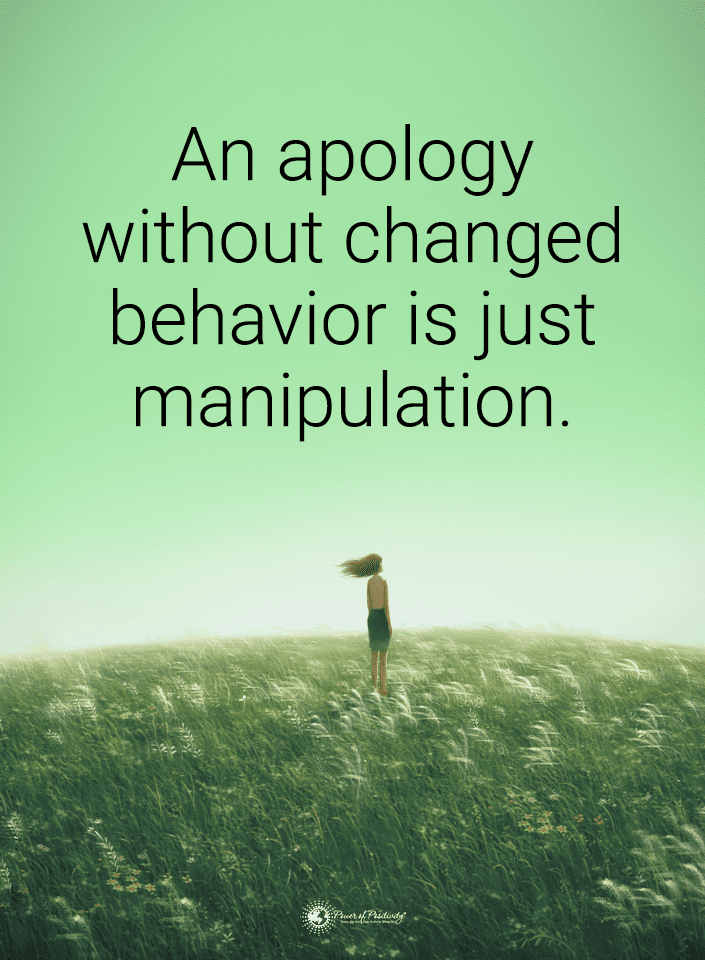You have likely had someone offer an apology that sounded insincere. It happens to all of us and doesn’t seem to help us feel better. Your instinct might be correct if you have this feeling, as many red flags reveal a manipulative or fake apology. A fake apology means that the other person isn’t worried about your feelings. If they were, they would apologize sincerely and make sure you understand they mean it.
If you know some of the red flags, it’ll be easier for you to spot the situation.
An apology can be a powerful way to strengthen a relationship and achieve forgiveness, but only if they’re heartfelt. The person apologizing must admit their mistakes and be remorseful for what occurred. It’s a vulnerable situation, and many people opt for a manipulative apology to make it less awkward for themselves.
What Are Fake Apologies?
Recognizing a manipulative or fake apology can help you protect your feelings and well-being. Experts indicate that this type of apology occurs when someone only says sorry in an attempt to de-escalate the situation or avoid accepting blame. The person doesn’t feel bad for their behavior but wants to control their feelings and thoughts.
Someone offering manipulation instead of sincere regret lack accountability and won’t usually change future behavior. The person twists their words to make you think they feel remorse when, in reality, they want to avoid your anger or sadness.
Some people offer insincere apologies to avoid punishment or social rejection. They want to alleviate negative emotions, but they don’t recognize guilt.
A Meaningful Apology
An apology requires the person apologizing to admit their fault and avoid doing it again. Apologizing also involves finding a way to make up for the hurtful behavior.
Red Flags That Reveal a Fake Apology
It’s not always easy to differentiate between a fake or meaningful apology. These signs can help you figure it out and protect yourself.
1 – Denying or minimizing your feelings
Even when someone hurts your feelings by mistake, they must acknowledge how they upset you. If they deny or minimize your feelings, it’s a sign that they’re gaslighting you. Anytime someone tells you how you should feel, they’re not apologizing.
2 – They apologize out of fear of losing you
When someone only apologizes because they don’t want you to walk out of their life, it’s a sign of manipulation. They don’t think about how this situation can be further upsetting because their only goal is to save the relationship.
The person might fear your anger and want to dissipate it without admitting that they hurt you. Sometimes they don’t understand why something upset you. Either way, it’s not okay to manipulate you in this way.
If they ask questions about why you’re upset, it’s not a sign of manipulation. It shows that they want to understand what they did wrong, implying that they want to avoid it in the future. They should still apologize without gaslighting you and saying you’re wrong.
3 – They only apologize for their benefit
When someone apologizes and immediately says that they hope you can forgive them, it’s not a good sign. The other person shouldn’t ramble about how they feel bad when you’re the one who had your feelings hurt. Sometimes they’ll even say something like being unable to live with themselves if you don’t accept the apology.
These kinds of apologies show that the apologizer cares more about their feelings than yours. They might give justifications, explanations, and reasons. A meaningful apology shouldn’t involve excuses.
The other person focuses on their feelings and perspective rather than considering yours. Their apology often lacks empathy, compassion, and kindness as they dismiss your pain.
4 – Their apologies are over the top
You might think dramatic apologies are good, but it’s a sign of manipulation. Over-the-top expressions of regret are another instance of the offender apologizing only for their benefit.
Narcissists often apologize this way to boost their self-image. It’ll often occur when there are other people around, and although it’s a grand act, it’ll still seem shallow and lack authenticity.
5 – There are conditions
If someone’s apology ever comes with conditions, it’s manipulative. They might say they’ll apologize, but only if you do something they want. Conditions imply that the person doesn’t care how you feel and that they only want to stop the conversation.
6 – They use the word “but”
An apology shouldn’t precede the word but. It’s a sign that the other person is making excuses for their behavior rather than owning up to wrongdoing. This kind of statement can also be their way of adding conditions.
Saying the word but is a manipulative way of shifting partial blame on you. They aren’t taking responsibility or acknowledging how they made you feel.
A meaningful apology doesn’t involve explaining why someone did what they did. Instead, it should focus on making you feel better.
7 – They only apologize about how you feel, not what they did
When someone only apologizes for how you feel and not what they did, it’s a sign of manipulation. It implies that your feelings are unwarranted or irrational. This phrase also hints that the person thinks your emotions are the issue rather than their behaviors causing the problem.
8 – Lack of responsibility
Anytime someone says sorry but doesn’t take responsibility, it’s a sign of manipulation. The person might say they were joking, avoiding saying sorry for what they did. Sometimes they’ll even blame you. They’ll say they only hurt you because of something you did first.
You deserve a sincere apology, even if someone doesn’t understand your feelings. You are entitled to how you feel, whether or not the person grasps the reason. Manipulative people don’t always feel that way and will likely show a lack of responsibility.
9 – They use bribes instead of apologizing
Some manipulators won’t apologize, and they’ll use bribes instead. They won’t ever say they’re sorry, but they’ll give you gifts or experiences.
When an apology is due, and someone gives you a gift instead, it’s manipulation. The person is controlling your feelings by bribing you to forgive and forget without an acknowledgment of what they did wrong.
Not only is this kind of apology unfair, but it can put you in an awkward position. You want the gift, and you might feel obligated to accept it. Then, if you give in, you’ll feel like you have to ignore the initial issue, although it’s not resolved.
10 – They mostly talk about themselves during the apology
Anytime a person talks about themselves more than they talk about what they did to hurt you, it’s manipulation. They want to justify why they behaved that way and want you to empathize with them rather than the other way around.
Heartfelt apologies should sympathize with your feelings. It shouldn’t be all about the person apologizing. If that’s how they behave, it shows that they don’t care about you as much as they say.
11 – They only say sorry when they want to stop talking about it
If their only reason for saying sorry is to get you to drop the subject, it’s a problem. They want you to let it go to avoid talking about it anymore.
If this happens, there’s no conclusion or solution to the original issue. The issues will come up again in the future, leading to repetitive behavior. They might even force you to accept their apology when you know they don’t mean it.
If someone says sorry this way, it’s controlling because they only tell you what you want to hear. They want to make you stop being upset and go about it this way. Their goal is to end the argument and avoid dealing with the issue.
12 – Playing it off as a joke
It’s manipulative anytime someone dismisses your feelings by saying it was just a joke. Having your feelings hurt isn’t funny, and it’s unacceptable for them to shrug off your emotions.
How to Respond to a Fake Apology
You don’t have to accept a fake apology. When someone tries to control you or dismiss your feelings, there are ways you can respond. Giving in their meaningless words it allows the manipulation to continue.
- Acknowledge the behavior: Don’t hesitate to call them out and tell them you know what they’re doing.
- Tell them how you feel: Let the person know why you won’t accept their attempt and how it affects you and your relationship.
- Express what you want: Tell them what you expect in the future and what you need for forgiveness.
- Don’t give in: When someone isn’t willing to acknowledge their wrongdoing, you don’t have to put up with it.
Final Thoughts on Red Flags That Reveal a Fake Apology
Dealing with manipulative people is never easy, especially when they offer meaningless apologies. Watch for the red flags that reveal a fake apology so you can protect yourself. Resisting these empty words allows you to control your life and stop further manipulation from that person.
Be honest with the other person about how their behavior makes you feel. Don’t give into their actions; make it clear you won’t allow them to continue hurting you. When you set these boundaries, you’re respecting yourself and improving your life.

















 Community
Community

